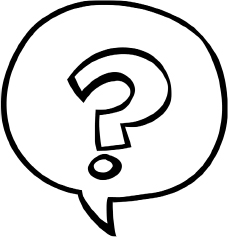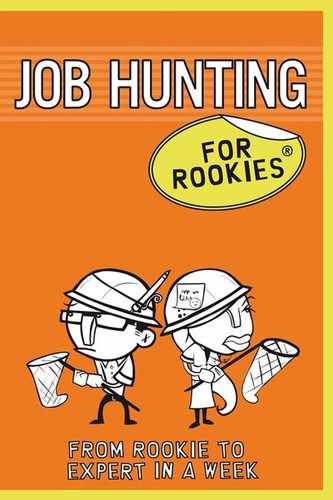CHAPTER 9
Preparing top answers
to the “super six”
questions
“Tell us about yourself”
Some interviewers like to begin interviews with this question. The open-ended nature of the question means that you could potentially answer it in many different ways, such as by talking about your personal or family life or your work.
However, remember that your sole objective during the interview is to persuade the interviewer that you possess the ability to deliver results for the organization. So use this question as an opportunity to focus immediately on your top qualities. Answer this question as if an interviewer had asked you: “Tell us about your recent career, focusing on the two or three key reasons we should hire you.”
 Rookie Buster
Rookie Buster
Remember that your sole objective during the interview is to persuade the interviewer that you possess the ability to deliver results for the organization.
Remember to tailor your responses based not only on your own experience but also on the needs of the particular employer. Use the following examples of responses to inspire your own answer:
• “I have been working as an account manager for five years and am now looking to progress by taking on a larger team in a more dynamic environment such as yours. I think that three things stand out on my CV. Firstly, that I have a track record of delivering and exceeding targets: I exceeded my sales targets in three out of the last four years and I have always been in the top 20 per cent of our account management team in terms of performance. Secondly, I have strong coaching skills, having coached and developed three of my team from fairly junior roles into assuming account management responsibilities of their own. Thirdly, I was ranked among the top 25 per cent of managers in terms of performance across the department of 14 managers.”
• “I am a teacher with a passion for growing the confidence of the students that I teach. When I came into my current job, our school was struggling quite badly and performing in the bottom quartile of the regional league tables in terms of standardized test performance. But I’ve been part of the team that has helped to push our results up for the last three years in a row. I can tell you in more detail about some of the initiatives I’ve either been involved in or led, but these include: a series of after-school workshops for students who wanted coaching on handling exam nerves; a project to revamp the timetable to put a greater focus on basic arithmetic where we had the greatest performance gaps; and an initiative to get parents more involved in helping their children with homework and attendance. Is there any particular aspect of my career that you’d like to focus on?”
Other ways to begin your own answer include:
• “My background is unique because…”
• “Throughout my career, I have demonstrated that I…”
• “I have developed a reputation for…”
• “Clients frequently say that I…”
By preparing for this question, you will also be ready to tackle similar questions such as:
• “Talk us through your career.”
• “Could you start by telling us what makes you right for this role?”
“Why do you want to work for us?”
Remember that employers want to hire people who want to work for them, rather than people who are just on the lookout for a job with the first employer who will offer them one. In constructing your answer, be sure to demonstrate some insights from the research you have conducted on the industry and this particular organization. And remember to be positive; focus on why you want to work for this organization rather than why you may need to leave a bad situation.
Consider these sample answers:
• “The next step in my career is to work on much larger projects. And I’m particularly drawn to you because of the more rapid growth that your firm has achieved in the last two or three years. From my understanding of the marketplace, it seems that midsized firms such as yours are uniquely positioned to continue to grow. But apart from your growth rate, I have to say that yours was the only recruitment brochure that seemed to have a sense of humour. Many of your competitors focused only on what made them great to work for. But yours seemed to focus equally both on why you’re great for a person’s career and also on the team ethos and enjoying the work that you do.”
• “A couple of things stand out. Yours is the only pharmaceutical business that has consistently invested at least 15 per cent of your net profits into research and development. I see that as a major competitive advantage, given that most pharma businesses are relying on older drugs and don’t seem to have many new ones in development. I am also drawn to your business because of the CEO’s ambition to make environmental sustainability a key plank of the business in the coming years.”
 Rookie Buster
Rookie Buster
Remember to be positive; focus on why you want to work for this organization rather than why you may need to leave a bad situation.
In responding to this question, think about other features or benefits that you could praise about a particular employer, such as:
• Its size (for example, smaller firms may have more of a family feel, while larger firms may have better-established training and development programmes).
• Its reputation in the marketplace.
• Awards it has won.
• New products or services that make it stand out from its competitors.
• Its ambitions or goals.
• Opportunities to travel and/or work abroad.
So why do you want to work for any particular organization?
Once you have prepared for this question, you would also be ready to answer similar questions such as:
• “What do you know about us?”
• “Tell us something about our organization that isn’t common knowledge.”
• “How do we differ from our competitors?”
• “If you were in charge of our organization, what would you do differently and why?”
• “What do you see as the strengths and shortcomings of our business?”
“Why should we hire you?”
Use this gift of a question to reiterate your top three or four qualities or skills. Remember that in delivering your response, you have to sound and behave as if you want the job. So focus both on what you say as well as how you say it.
Consider these two examples:
• “From my reading of your job advert, I understand that you are looking for someone who has excellent communication and influencing skills, a high degree of technical expertise and a willingness to go the extra mile for customers. I believe that I meet the brief in all of those aspects. I can talk you through several examples of how I have explained highly technical initiatives to customers in very simple language that focuses on the benefits to them rather than on the detail; in every instance, I work to understand what their particular needs are so that I can meet them in every way. And in terms of willingness to go the extra mile, just the other week, a customer overseas sent me an email and I happened to be online at 2am and responded it to it immediately – and the customer actually emailed back that she hadn’t expected a response quite so amazingly quickly!”
• “I’ve already talked through examples of how I’ve worked ceaselessly to help my team and department to achieve both their monthly and yearly targets. In addition, I also have an extensive network of contacts across the industry, which allows me to keep at the leading edge in terms of ideas and new initiatives in our field. Finally, I have set myself a goal of having the responsibility for leading a team within the next five years, so you know that I shall be working tirelessly to achieve that.”

 Rookie Buster
Rookie Buster
Remember that in delivering your response, you have to sound and behave as if you want the job.
“What are your main strengths?”
This question is really just a variation on “Why should we hire you?” However, I have included it to give you further examples of how to emphasize the key reasons why the interviewers should pick you over the other candidates.
Remember that the answer you give to the interviewer at one organization may need to differ from the answer you give to another. Have a look again at the two job adverts for a similar role at ABC Banking Corporation and XYZ Home Trading (on page 44 in Chapter 3). While the two jobs are very similar, each organization emphasizes slightly different skills. And, as a smart candidate, you would emphasize different strengths during different interviews too.
Consider the following examples in crafting answers that are right for you:
• “In my last review, my line manager said that I have three key strengths: my analytical skills, creativity and a willingness to take the initiative. She says that she can always rely on me to break complex problems down into smaller chunks that the rest of the team can get working on. In terms of my creativity, I’m always asked by people from the marketing department to sit in on new product development committees to share my thoughts. And I’m the kind of person who enjoys keeping busy, so I’m always on the lookout for ways to make the team work better.”
• “My team tells me that I’m a very good manager to work for. They say that I listen to their views before making decisions and once I’ve made my decisions I give them a lot of autonomy in how they get on with their work. I’ve been told several times that I’m also a very strong coach as I take a genuine interest in both the development and welfare of the people around me. I think my leadership style has been really important in helping to grow the confidence and ability of my team – and that’s why we managed to meet all of our objectives and even succeeded in driving costs down by an additional 2.4 per cent below the target that had been set for us.”
“What are your weaknesses?”
Most interviewers who ask about your strengths will also enquire about your weaknesses. Saying that you have no weaknesses will make you seem incredibly arrogant and not the kind of person that an interviewer will want to hire. Revealing some weaknesses shows that you possess self-awareness and a sense of humility. But be careful not to tell the interviewer what you think your actual faults or flaws may be.

A safer route is to choose a couple of weaknesses that in no way affect your ability to do the job for this organization. For example, if you are applying for a job in data inputting, then you may be able to admit quite safely that you aren’t very good at giving presentations. If you’re being interviewed for a job as a senior manager, you could admit to being poor at administration and attention to trivial detail.
 Rookie Buster
Rookie Buster
Revealing some weaknesses shows that you possess self-awareness and a sense of humility.
When talking about a weakness, you must finish your response by describing how you compensate for or have worked to overcome your weakness. Use these examples to create your own answers:
• “I have to admit that I’m not very good at working on my own. I thrive off the energy of having people around me and having customers or colleagues to work with. So that’s why I enjoy working in sales and why I want to work for a dynamic business such as yours where I will constantly be working collaboratively with the rest of the team in the pursuit of new customers.”
• “I’m not very good at doing the admin that I know I should be doing. But thankfully I’m in a position now where I can rely on my personal assistant to handle my diary and paperwork for me.”
 Rookie Buster
Rookie Buster
When talking about a weakness, you must finish your response by describing how you compensate for or have worked to overcome your weakness.
“Do you have any questions for us?”
Almost all interviewers will give you the opportunity to ask questions. You may be tempted to respond: “No, because you’ve already answered all of my questions, thank you.” But that could be a mistake.
Asking intelligent questions signals intelligence. Questions demonstrate your keenness and interest in the job. And the right questions can reinforce that you really have done your research on the employer.
 Rookie Buster
Rookie Buster
Questions demonstrate your keenness and interest in the job.
Avoiding the wrong questions
But before I tell you how to answer this question, let’s consider topics that you definitely must never bring up. In order not to appear greedy or lazy, be sure to avoid asking about:
• The salary, bonuses, benefits or other issues related to your remuneration package.
• The working hours, the need for overtime, or your holiday entitlement.
Of course you may want to know the answers to those questions. Many employers will provide that kind of information on their website or in the recruitment literature (such as their information pack or the original job advert). If an employer does not provide that information, at least wait until after you have been offered the job before asking about it.
Another rule in deciding what questions to ask is to ask only for information that you could not have gathered in your research. For example, asking about the organization’s new products would be foolish if the organization’s website or other literature has pages of information about planned product launches.

Asking the right questions
Choose carefully the questions you ask. Consider the following list of questions that you may ask – but only if you are sure that you should not already have found the answers out in some other way.
Here are some questions about the day-to-day work:
• “I’ve read about the job description online, but could you talk me through your experience of what the typical working day looks like?”
• “What kind of training would I receive to begin with?”
• “Why has this position become available?”
• “What do you see as the key tasks for success in this role?”
• “How would my performance be evaluated?”
• “Looking towards the future, what are the prospects for people who start in this role?”
You may also wish to ask about the culture of the organization – that is, what it’s like to be a part of the team:
• “How would you describe the culture around here?”
• “What kinds of people do well within the organization – and why?”
• “When other people have joined and not worked out, what do you think they did or didn’t do?”
• “Would you mind if I asked why you decided to join the organization?”
Tailoring your questions
Remember to tailor your questions based on what you already know about the organization. You can make the strongest impact by mentioning some piece of insight or information and using it to lead into a question. Consider these examples:
• “My reading of analyst reports suggests that you’re moving out of selling directly to consumers and will be focusing more on businesses. How would that affect this department?”
• “One of your press releases on the website says that you’re planning to open 35 new stores nationwide. Realistically, what are the opportunities for someone at my level to get involved in that expansion over the next 18 months?”

Coach’s notes 
• Always answer questions that invite you to talk about yourself by talking about your recent career and highlighting your most relevant two or three skills.
• Do enough research to ensure you can talk about a handful of reasons you wish to take on this specific role with this particular employer; avoid at all costs talking about why you may wish to leave a bad situation elsewhere.
• Before an interview, list the top handful of your skills that will be of most interest to that particular employer. By doing that, you will be ready to answer any questions about your strengths or why they should hire you.
• Be ready to admit some minor weakness, as saying you have none smacks of arrogance. However, be sure to mention how you compensate for or have worked to overcome your weakness, to reassure employers that your weakness is under control and in no way a concern for them.
• Prepare at least a half-dozen questions to answer during the interview. Saying that you have no questions could be interpreted by an interviewer as lack of interest on your part.
Go for it! Be confident in your ability to wow the interviewers. Avoid trying to memorize answers to the many questions that could crop up. However, do sketch out approximately what you would say to this handful of the most common questions. Honestly, these questions come up time and again, so other job hunters (but not you!) are stupid not to put in the thinking. Prepare the key points you want to get across, and you can ace that interview!

Notes |
Notes |

